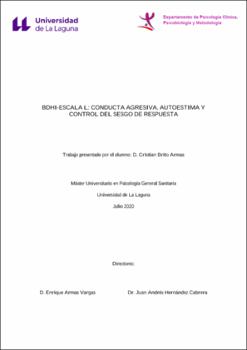BDHI-escala L: conducta agresiva, autoestima y control del sesgo de respuesta
Autor
Brito Armas, CristianFecha
2021Resumen
El BDHI ha sido una de las medidas más utilizadas a nivel internacional en la
medición del comportamiento agresivo, a pesar de haber recibido numerosas críticas
respecto a sus propiedades psicométricas. En la evaluación del comportamiento
agresivo es frecuente el uso de escalas que controlan el sesgo de respuesta a la prueba.
Con este fin, se incorpora la Escala L al BDHI. En el presente trabajo, se relaciona la
conducta agresiva con el control del sesgo de respuesta y la autoestima. Para ello, se
hace uso de la nueva estructura factorial del BDHI-Escala L (α .90), el AQ, el CAE y
las escalas de Deseabilidad Social y Sinceridad de ATRAMIC. La muestra utilizada
está conformada por 223 adultos de las Islas Canarias (102 hombres y 121 mujeres;
Medad=35.25; DT=10.46). Los varones obtienen mayor puntuación en agresión física y
autoestima positiva, mientras que las mujeres puntúan más alto en agresión verbal,
hostilidad, ira y problemas de autoestima. No se encontraron diferencias significativas
por sexo en agresión indirecta ni en las escalas que controlan el sesgo de respuesta. Los
resultados de las regresiones múltiples sugieren que las personas que se muestran
sinceras en sus respuestas tienden a reconocer aspectos negativos de su
comportamiento, y que las personas que admiten conductas hostiles, tienden a mostrarse
de forma más honesta reconociendo el comportamiento agresivo. The BDHI has been one of the most widely used measures at the international
level for measuring aggressive behaviour, despite having received numerous criticisms
regarding its psychometric properties. In the evaluation of aggressive behavior, the use
of scales that control for test response bias is common. To this end, the L Scale is
incorporated into the BDHI. In the present work, aggressive behavior is related to the
control of response bias and self-esteem. For that purpose, we use the new factor
structure of the BDHI-L Scale (α .90), the AQ, the CAE and the ATRAMIC Social
Desirability and Sincerity scales. The sample used consists of 223 adults from the
Canary Islands (102 men and 121 women; Mage=35.25; DT=10.46). Males score higher
on physical aggression and positive self-esteem, while females score higher on verbal
aggression, hostility, anger and self-esteem problems. No significant differences by sex
were found in indirect aggression or in the scales controlling response bias. The results
of the multiple regressions suggest that people who are honest in their responses tend to
recognize negative aspects of their behavior, and that people who admit to hostile
behavior tend to be more honest in recognizing aggressive behavior.




